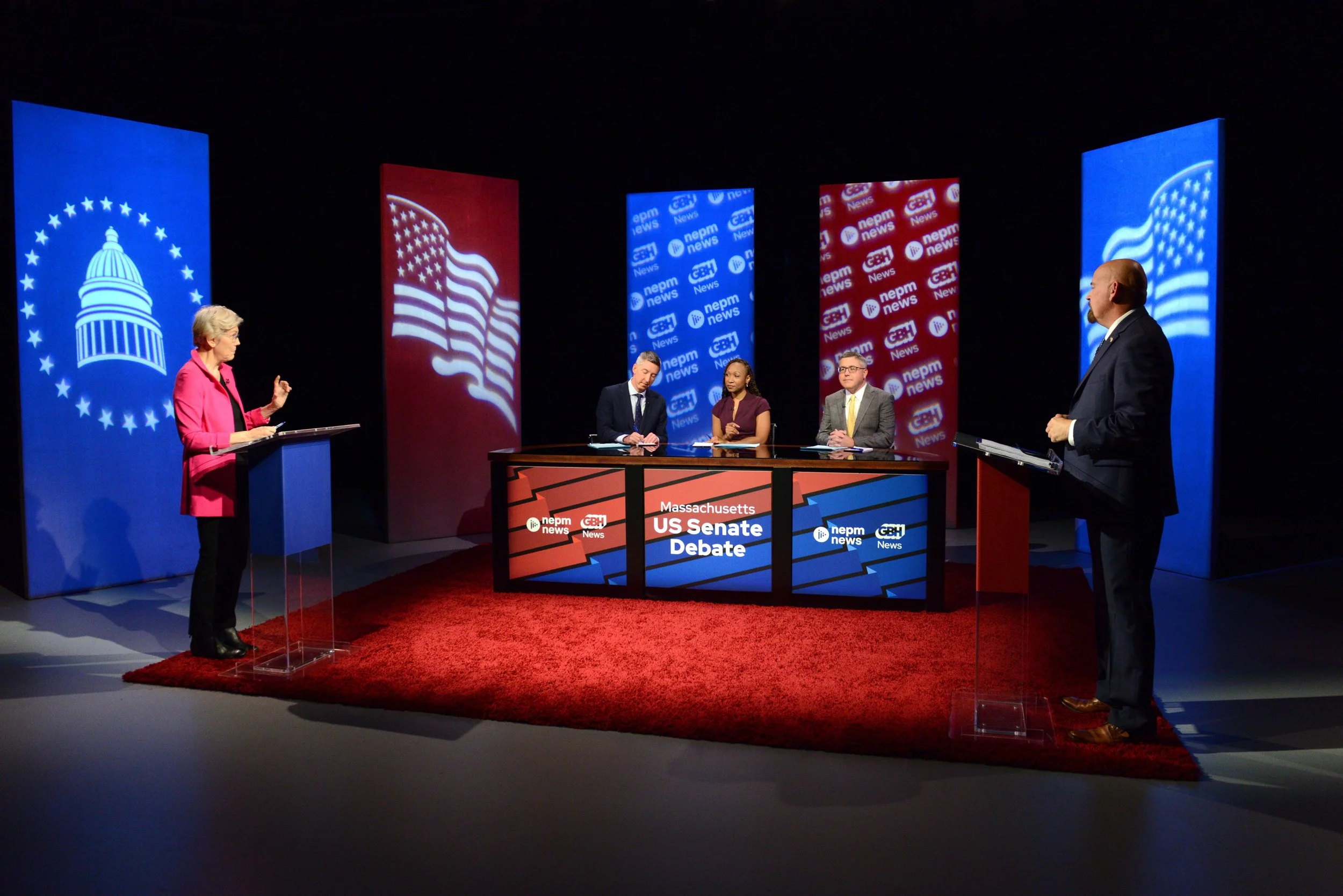Photo courtesy of Meredith Nierman via GBH News
Supporters of Elizabeth Warren and John Deaton gathered outside the New England Public Media building in Springfield, where the debate took place.
By Tara Monastesse ’25
Editor-in-Chief
Democratic Massachusetts Senator Elizabeth Warren and Republican challenger John Deaton met in Springfield, Massachusetts. on Oct. 17 for their second and final debate ahead of the Nov. 5 General Election. During the hour-long debate, hosted by GBH News and New England Public Media, the candidates grappled with each other’s visions for the future of Massachusetts as well as how they would function under a future Trump or Harris administration if elected senator.
Deaton, whom GBH News described as a “Marine Corps veteran, personal injury lawyer and cryptocurrency enthusiast,” is looking to unseat Warren, an incumbent who has served in the U.S. Senate since 2012. Much of the debate took on the same combative tone as the candidates’ matchup in Boston two days prior.
This time around, Warren and Deaton debated the future of transportation infrastructure and economic development in Western Massachusetts as moderators’ questions probed issues of importance to local voters.
In the debate’s first half, the candidates were asked about their stance on the East-West Passenger Rail, a proposed extension of the existing passenger railway system that would provide service between Boston and several key cities in the western part of the state: Springfield, Worcester and Pittsfield. While both candidates expressed enthusiastic support for the plan, they each used the topic as an opportunity to emphasize their individual approaches to pursuing infrastructure developments.
Warren described herself as “all in” on the proposed railway system. “I think it will fundamentally transform not just the economy in Western Mass., but for every part of Massachusetts,” she said. She emphasized the importance of being reelected as a Democratic representative in order to secure funding for the project, arguing that her Republican colleagues in the Senate have historically been resistant to approving funding for infrastructure development.
Deaton also expressed his support for the railway extension, describing greater ease of access between the two halves of Massachusetts as a potential solution to alleviating the high cost of housing in the state. “Senator Warren and I certainly can agree that we need to invest in Western Mass.,” he said. He closed out the discussion by arguing that government “red tape” has been an obstacle for infrastructure development, citing building permits as a source of delayed construction.
Deaton brought up the Western Massachusetts economy again in response to a question about Massachusetts’ investment in offshore wind power. He argued in favor of a pause on offshore wind power development in order to reallocate resources towards developing renewable energy in other parts of the state. “I believe Western Mass is the prime place where we can establish renewable energy and revitalize this economy in this state,” he said, echoing his earlier comments in the debate about the potential for the region’s economy and job market to thrive if alternative energy was prioritized.
In response to a question about her political ambitions, Warren spoke about her commitment to serving Massachusetts and her contributions to the Western Massachusetts economy as senator. “I’ve gotten half a billion dollars into our local military installations, mostly in Western and Central Massachusetts,” she said. Warren also highlighted the funding she had advocated for Western Massachusetts programs such as Pittsfield-based homeless veteran support nonprofit Soldier On and the Latino Economic Development Corporation in Springfield.
Warren continued to speak of the Latino Economic Development Corporation with reporters after the debate, describing them as “a really smart group on the ground right here in Massachusetts, right here in Springfield, that is supporting these [Latine-owned] small businesses.”
According to a University of Massachusetts Amherst/WCVB poll of Massachusetts voters released two days before the debate, Warren polled ahead of Deaton significantly at 56% to 34%. Deaton said after the debate that one motivation to enter the Senate race is “to try and do something about the one party rule that’s here in Massachusetts,” in reference to the Democratic Party’s dominance in the state.
“If I wanted an easy Senate race, I wouldn’t have come to Massachusetts,” Deaton told reporters. “I think we all can agree that taking on Elizabeth Warren is not an easy path.”
Quill Nishi-Leonard ’27 contributed fact-checking.

